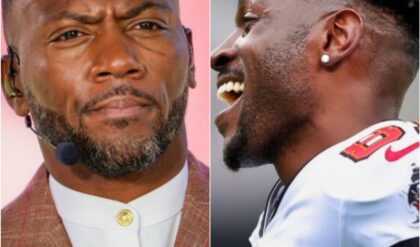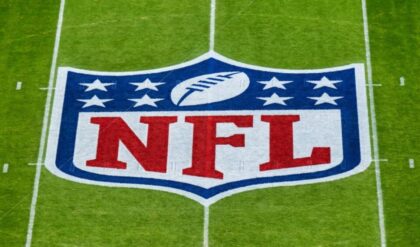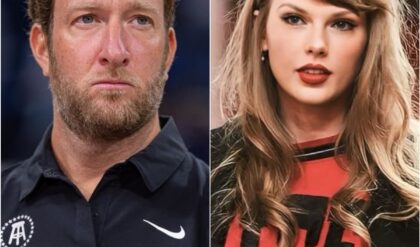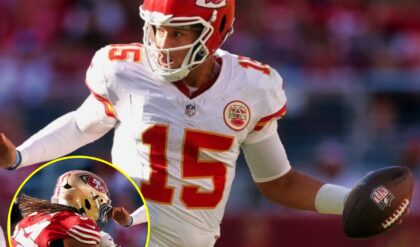NFL kicker Harrison Butker has made headlines with his firm refusal to endorse Nike, criticizing the brand for its continued support of Colin Kaepernick. “Still supporting that Kaepernick clown? No thanks,” Butker remarked, sparking widespread discussion.
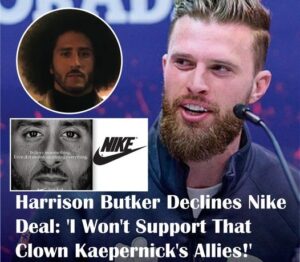
“It’s refreshing to hear from someone who isn’t spewing the woke status quo,” Butker continued. “I won’t work for them, or Target, or Planet Fitness. They’re all just a bit too ungodly for my taste. As an NFL star, it’s tough to turn down millions in endorsements, but some things are more important than money—like your mortal soul.”
Butker’s bold stance has ignited debate, with many applauding his commitment to his principles in an industry increasingly dominated by corporate and political interests.
Title: Upholding Principles: Harrison Butker’s Stand Against Corporate Influence
In a world where athletes often align with lucrative endorsements, Kansas City Chiefs’ kicker Harrison Butker made a bold statement by rejecting a Nike endorsement. His decision reverberated through sports media, sparking debates on athlete activism, corporate influence,
and the boundaries between personal beliefs and professional endorsements. Butker’s refusal to associate with Nike, citing their support of Colin Kaepernick, ignited both praise and criticism, highlighting the complexities of navigating principles in a commercialized sports landscape.
Butker’s stance unveils the tension between personal convictions and financial gains, revealing a deeper introspection among athletes regarding their roles as public figures. In an era marked by heightened social awareness, athletes increasingly leverage their platforms to
advocate for social justice causes, challenging the notion of remaining apolitical. Butker’s rejection of the Nike endorsement underscores his commitment to authenticity, prioritizing principles over profit.
The Kaepernick controversy serves as a backdrop to Butker’s decision, symbolizing the polarizing nature of athlete activism. Kaepernick’s peaceful protest against racial injustice during the national anthem divided public opinion, with some viewing it as a courageous stand and others as disrespectful. Nike’s endorsement of Kaepernick further entrenched these divisions, positioning Butker’s refusal as a statement against corporate alignment with contentious social issues.
Butker’s decision prompts reflection on the responsibilities of corporations in supporting athlete activism. While some applaud Nike’s commitment to social justice, others criticize it as opportunistic marketing. Butker’s rejection challenges corporations to align their endorsements with genuine values rather than fleeting trends, emphasizing the importance of sincerity in corporate social responsibility.

Moreover, Butker’s stand amplifies discussions on the influence of corporate endorsements on athlete autonomy. As athletes become brand ambassadors, they navigate a delicate balance between commercial obligations and personal convictions. Butker’s rejection of the Nike endorsement signals a reclaiming of agency, asserting that athletes should not be beholden to corporate agendas at the expense of their values.
The reactions to Butker’s decision reflect broader societal divisions on issues of race, politics, and corporate influence. Supporters commend Butker for his integrity, applauding his willingness to forgo financial gain for the sake of his principles. Critics, however, condemn his rejection as misguided, accusing him of prioritizing personal beliefs over lucrative opportunities.
Nevertheless, Butker’s refusal catalyzes conversations on the evolving dynamics of athlete activism and corporate partnerships. It prompts athletes to reassess their endorsements through a lens of social responsibility, urging corporations to demonstrate genuine commitment to the causes they champion. Butker’s stand transcends sports, resonating with individuals who value integrity over conformity in an increasingly commercialized world.
As Butker remains steadfast in his decision, his actions inspire a new generation of athletes to uphold their principles despite external pressures. His rejection of the Nike endorsement serves as a reminder that authenticity and integrity should never be compromised for financial gain. In a society where commercial interests often overshadow moral considerations, Butker’s defiance reaffirms the enduring power of individual convictions in shaping collective consciousness.
In conclusion, Harrison Butker’s rejection of the Nike endorsement reverberates far beyond the realms of sports, igniting discussions on athlete activism, corporate responsibility, and the pursuit of authenticity in a commercialized world. His unwavering commitment to his
principles serves as a beacon of integrity, challenging athletes and corporations alike to align their actions with their professed values. As the discourse surrounding Butker’s decision continues to unfold, it underscores the enduring significance of individual agency in effecting societal change.

